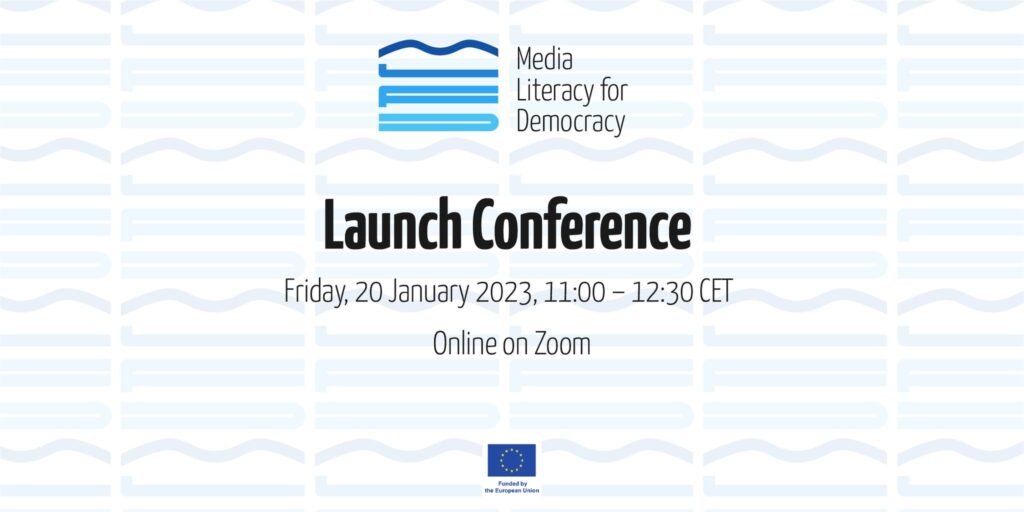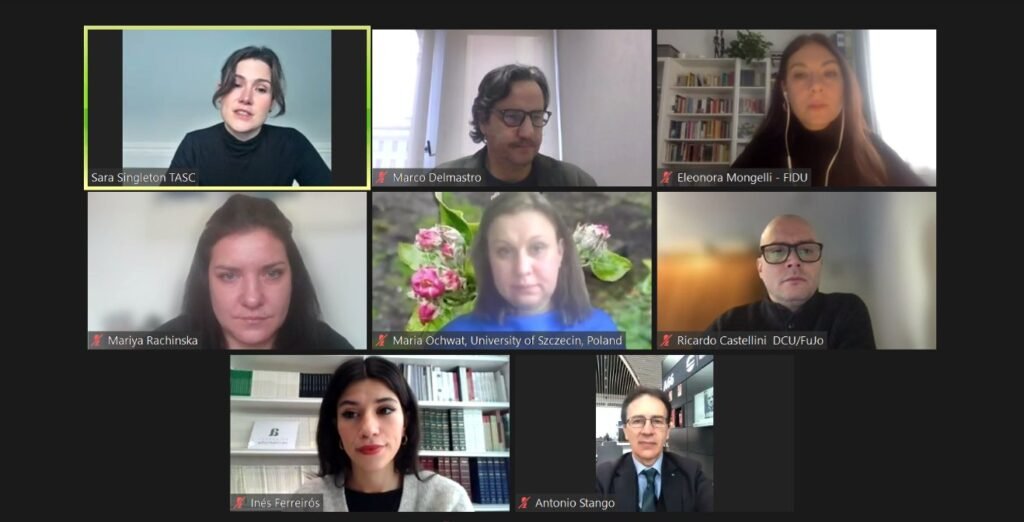
The MLFD project’s launch conference was held online on January 20 and gathered the MLFD’s identified target groups, specifically representatives of CSO’s, institutions, media, universities, as well as students and European citizens from different backgrounds with a total of 123 participants from 9 countries (Ireland, Poland, Italy, Spain, Bulgaria, Belgium, Greece, France and Slovenia). The event had an educational, awareness-raising and dissemination function and was an opportunity for interested parties to exchange ideas and compare initiatives and situations across different EU countries.
The objectives of the MLFD project have been identified considering the results of a previous EU funded project led by FIDU, CommEUnication. Starting from the outcomes of the concluded project, the MLFD launch conference set the base to present the project to a wide audience and to elaborate further the discussion about disinformation. The debate touched a wide range of topics, including disinformation around migrants and asylum seekers and pedagogical approaches to addressing disinformation.

SPEAKERS:
Dr Sara Singleton, Senior Researcher for TASC (Think Tank for Action on Social Change) based in Dublin, opened and managed the conference with some notably remarks:
”In Ireland we have actually very high trusted media. A 2021 survey showed that Irish people are very highly interested in media and 10% of people in that survey have written themselves extremely interested in news, which is about 10% above the EU average”.
Eleonora Mongelli, Vice President at FIDU and MLFD coordination started presenting the main phases of the MLFD project. She outlined the project’s activities, aims and target groups, and she examinated disinformation from the point of view of human rights experts, showing the dangers and the bad repercussions on democracy of this phenomenon.
Mariya Rachinska, Co-founder at FECE (Foundation for Entrepreneurship, Culture, and Education) based in Bulgaria presented to the consortium the MLFD booklet. It’s a small book on disinformation and media literacy, drafted with the contribution of the participating partners and released on January 15. The aim of the booklet is to raise awareness about the risk of mis- and disinformation in the EU and the need of an effective and inclusive media literacy strategy based on the multidisciplinary approach and the cross-sector cooperation. The MLFD booklet has offered several talking points about the disinformation issue during the project’s launch conference.
Dr Jesus Ruiz Huerta, Director of Fundación Alternativas Public Policy laboratory and Inés Ferreirós, Coordinator of the Fundación Alternativas laboratory rivived the debate on the topic of misinformation, giving some examples on how this bad phenomenon has affected Spanish society. Particularly attention has been given to how disinformation has affected the perception of immigration.in Spain:
“Disinformation is what explains the rejection of immigration and the consideration of immigrants as a second class in Spain. More than 50% of Spanish believe that more aid is given to immigrants than to a Spaniard and the idea that immigrants steal jobs from the non-immigrant population.is also widespread”.
Dr Ruiz ended his intervention affirming that citizens have to recover the dignity of truth and dignity cannot be nogotiable. European citizens have to understand that Europe will not manage to survive without immigration so we should not be so afraid of that because all great cultures rised thanks to the course of the cross-breeding phenomenon.
Dr Maria Ochwat from the Faculty of Social Sciences, Political Science and Security Studies at the University of Szczecin in Poland updated the members of the MLFD consortium with the results of some researches on disinformation conducted among Polish citizens.
“Disinformation is becoming an increasing threat to human rights and civil societies. This is also the case of Poland where citizens have been witness of several disinformation campaigns on many topics: the effectiveness of Covid-19 vaccines, the dangers caused by the migration crisis in 2015 and 2016, the repercussions on the nation of the war in Ukraine”.
Despite all these problems Poland still doesn’t have a security strategy in the information space. At the moment Polish only have a draft made by their security office in 2015 but this document only indicates what disinformation is, the risks and threats associated with it so this document absolutely needs an update with more effective tools to combat disinformation.
Dr Ramón Ruiz Ruiz, Director and Professor at the Department of Criminal Law, Philosophy of Law, Moral Philosophy and Philosophy at University of Jaén in Spain, showed some effects of disinformation in Spain. The Spanish citizens, together with the Portuguese are the most worried European about this issue. More than 90% of Spanish declared that they use social networks to get informed and more than 83% of them declared that they came across a fake news. For this reason the general level of trust in the media has gone down. Traditional media such as television, radio, written press still inspire and have good credibility but they are used less and less by young people. According to a survey, the 78% of young people between the age of 16 and 24 don’t know how to differentiate between false and true news. This is in fact the most vulnerable group to be the target of disinformation campaigns who want to generate a distortion of reality.
Social scientist Marco Delmastro, author of several books, and scientific publications has examinated the issue of disinformation from a sociological point of view. Starting from the news selection action, Delmastro explained how the gatekeeping process works. Gatekeeping is the process through which information is filtered (selected) for dissemination. It refers to the idea that too many events occur for the media to cover all of them, so it must therefore choose which ones to specifically cover. After an event occurs, information about it is then chosen by a journalist and entered into media channels; then, as it passes through the gates and is affected by multiple levels of influence, a frame and a story is crafted. After this introduction, Delmastro has used different charts to better explain participants the dynamics of disinformation flow and the engaging power of narratives.
Dr Ricardo Castellini da Silva is a media literacy educator for EDMO (European Digital Media Observatory) in Ireland. He works with Dublin City University’s Institute of Future Media, Democracy and Society, as well as the University’s Anti-Bullying Research Centre. He explained participants the work of the European Digital Media Observatory (EDMO) which brings together fact chechers, media literacy experts and academic researchers to understand and analyse disinformation in collaboration with media organizations, online platforms and media literacy practioners.In association with Media Literacy Ireland (MLI), the University College of Dublin and the Local Government Management Agency (LGMO), EDMO Ireland is developing a National media literacy project involving public libraries across the country. Dr Da Silva warns us that is important to break the dichotomy between fake news and the media. Tackling disinformation is not simply teaching young people about what is real and what is fake but it’s actually giving them the opportunity of being inquisitive and resilient to all media forms and one of the means to do so is starting thinking in terms of representations. Last but not least Dr Da Silva said that we have to “look inside ourselves” which means understanding our mind and behaviour: the consumption of media content is not purely rational. It involves emotion, desire, illusion, imagination etc. We all have some psychological traits that get in the way of a more objective and rational analysis.
Antonio Stango, President of FIDU during his intervention noticed that in the last few years we have been watching how great events all over the world have been somehow affected by disinformation. Two main examples are the largest invasion of Ukraine and Covid-19 pandemic. In both cases we have been watching a scientific work of disinformation by two authoritarian regimes: the Chinese one for Covid pandemic and the Russia Kremlin for what concerns the invasion of Ukraine. After giving some examples of how these authoritarian regimes tried to spread disinformation on these topics, Dr. Stango underlined that: “That’s why this project is important: we try to give to all people, starting from the youth but not only, some tools to identify properly what disinformation is and how to contrast it” .
The event concluded with a question-and-answer session where participants had the opportunity to ask questions to panel members. These questions centred around how to balance freedom of speech with fighting mis- and disinformation; how to support mainstream media while holding it accountable; and, how to keep citizens engaged in democratic processes. The number of questions that were posed by the audience showed that the level of engagement had been high throughout the whole event, highlighting a strong interest for this kind of topic. The reactions and comments left in the chat also show great engagement and interest in the project activities, as participants shared their appreciation for the content of the event, its “educational” nature, and their interest in how to become active part and contribute to the project activities. The event was an opportunity for interested parties to exchange ideas and compare initiatives and situations across different EU countries. Topics covered included disinformation around migrants and asylum seekers and pedagogical approaches to addressing disinformation

